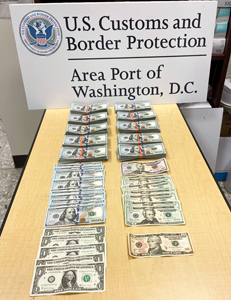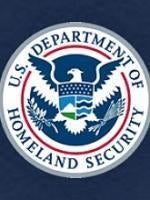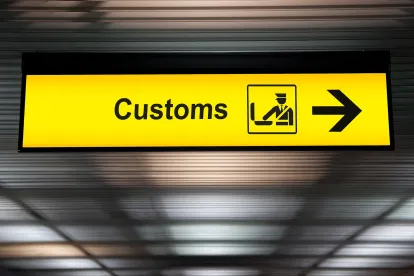STERLING, Va. – U.S. Customs and Border Protection officers seized more than $227,000 from travelers departing Washington Dulles International Airport to Africa during the last 30 days for violating U.S. currency reporting laws.

The largest of the four unreported currency seizures - $101,825 from a U.S. couple destined to Nigeria.
The most recent seizure was the largest as CBP officers seized $101,825 from a U.S. citizen couple destined to Lagos, Nigeria on Saturday. The couple verbally declared $19,600 and completed a U.S. Treasury Department FINCEN 105 form reporting that amount. A subsequent baggage search revealed additional envelopes of currency. Officers seized all the currency and released the travelers.
Also on Saturday, CBP officers seized $13,332 in unreported currency from a U.S. lawful permanent resident who was destined to Addis Ababa, Ethiopia. The resident, a Togo national, reported that he possessed $2,700. Officers discovered the additional currency during a baggage examination.
On October 1, CBP officers seized $82,560 in unreported currency from a U.S. traveler who attempted to board a flight to Accra, Ghana, and on September 17, CBP officers seized $29,822 in unreported currency from a U.S. father and daughter who were boarding a flight to Doha, Qatar. A CBP currency detector dog alerted to the bulk currency in these two seizures.
The total amount of unreported currency seized was $227,539.
CBP is not releasing any of the travelers’ names because none were criminally charged.
“The most important lesson for international travelers to understand is that they can travel with as much currency as they desire, but that they must truthfully report it all to a CBP officer. It’s that simple,” said Kim Der-Yeghiayan, Acting CBP’s Area Port Director for the Area Port of Washington, D.C.
There is no limit to how much currency or other monetary instruments travelers may bring to or take out of the United States. However, federal law [31 USC 5316] requires travelers to report all currency of $10,000 or greater to a CBP officer and complete U.S. Treasury Department Report of International Transportation of Currency or Monetary Instruments [FINCEN 105]. Read more about currency reporting requirements.

Best advice for international travelers: truthfully report all currency to a CBP officer that you are carrying from or to the United States.
The consequences for violating US currency reporting laws are severe – from missing a flight and interrupting vacation plans, to seeing all their currency seized by a Customs and Border Protection officer, and to even facing potential criminal prosecution for bulk currency smuggling.
Travelers can get an early start on reporting their currency by completing the fillable FINCEN 105 form prior to a CBP arrivals or departure inspection.
CBP officers and agents seized an average of about $342,000 in unreported or illicit currency every day during 2021 along our nation’s borders. Learn what else CBP accomplished during "A Typical Day" in 2021.
CBP encourages all travelers to learn the rules governing what they can and cannot bring to the United States, plus the steps during CBP's international arrivals process by viewing CBP's Know Before You Go webpage. Just a little research can save travelers time during their arrivals inspections and get them to their destination sooner.
CBP's border security mission is led at ports of entry by CBP officers from the Office of Field Operations. CBP officers screen international travelers and cargo and search for illicit narcotics, unreported currency, weapons, counterfeit consumer goods, prohibited agriculture, and other illicit products that could potentially harm the American public, U.S. businesses, and our nation’s safety and economic vitality.
Please visit CBP Ports of Entry to learn more about how CBP’s Office of Field Operations secures our nation’s borders. Learn more about CBP at www.CBP.gov.
Click here to read the full press release on the CPB website.




 />i
/>i
